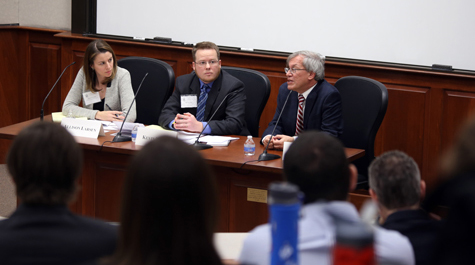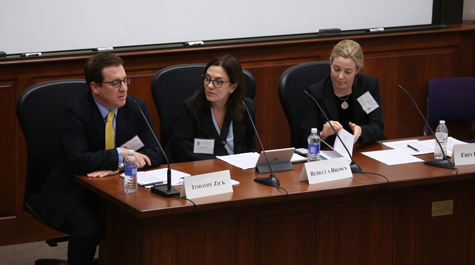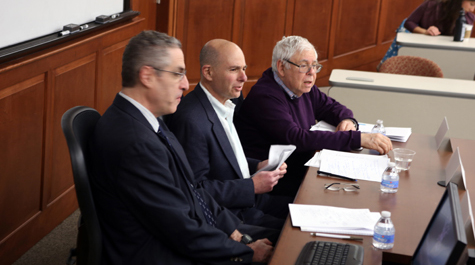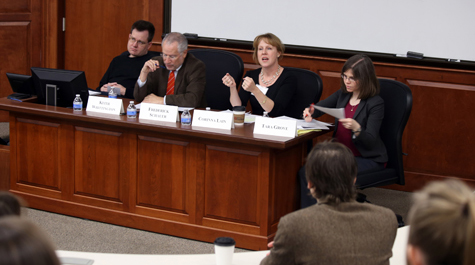Law Review Hosts Symposium on the Issue of Constitutional Interpretive Authority
On February 19 and 20, nearly a dozen prominent legal scholars and educators gathered at William & Mary Law School to discuss constitutional interpretation and just who should have the final say in deciding the Constitution’s meaning.
Hosted by the William & Mary Law Review and the Institute of Bill of Rights Law, the symposium—Judicial Supremacy v. Departmentalism—focused on the issue of constitutional interpretive authority.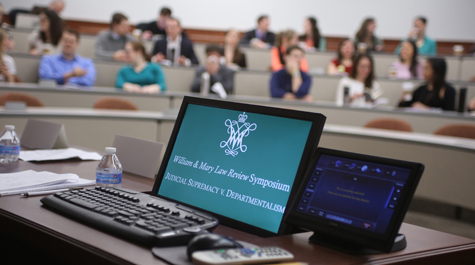
Typically, the majority of scholars, lawyers, judges, and members of the public accept “judicial supremacy,” the notion that it falls to the judiciary, and ultimately to the United States Supreme Court, to determine the meaning of the Constitution. However, an increasing number of scholars advocate “departmentalism,” the idea that each branch of government—the executive, the legislature, and the judiciary alike—has its own, independent role to play in determining constitutional meaning.
Some scholars, the symposium’s description notes, even argue that each branch has an independent duty to interpret the Constitution and to act upon that view.
The specific question left to the invited scholars, then, was: Does the judiciary have the final say in determining the Constitution’s meaning, or does each branch of government have its own say?
Invited speakers were clearly divided on the issue. For instance, Erwin Chemerinsky, the founding Dean of UC Irvine School of Law, defended judicial supremacy, arguing that the decisions of the U.S. Supreme Court are binding until overruled or counteracted by a constitutional amendment.
Kevin Walsh, Professor of Law at the University of Richmond School of Law, on the other hand, argued for judicial departmentalism. Walsh contended that each department has the authority and responsibility to interpret the Constitution’s meaning.
While it is not clear whether the scholarly support for departmentalism will gain traction, the symposium certainly provided much food for thought.
And that suited conference organizer William and Mary Law Professor Tara Leigh Grove just fine. In her concluding remarks, Grove said she suggested the topic of “Judicial Supremacy vs. Departmentalism” mostly to raise questions.
“I think in our broader society and within the Law School, too, there’s an assumption that the Supreme Court decides what the Constitution means,” Grove said. “My hope is that, if nothing else, you'll ask yourself the question, ‘Does that make sense?’ Even if your ultimate decision is, ‘Yes, it does.’”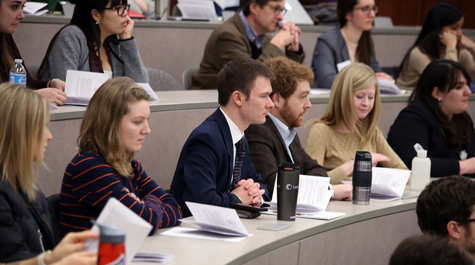
Grove was grateful for the many questions posed during the two-day event: What is judicial supremacy? What is Court control? What is departmentalism? How much do we trust the Supreme Court? How much do we trust Congress and the Executive?“
I will feel this conference is a true success if all of you think about these questions and continue to debate them,” Grove told the students in attendance, “not only throughout your law school careers, but also once you go out into legal practice.”
Since 1957, the William & Mary Law Review has published important scholarly work and has become one of the top general interest law journals in the country. Published six times per year - in October, November, December, March, April, and May - the Review has featured the work of noted scholars in all areas of the law.
About William & Mary Law School
Thomas Jefferson founded William & Mary Law School in 1779 to train leaders for the new nation. Now in its third century, America’s oldest law school continues its historic mission of educating citizen lawyers who are prepared both to lead and to serve.
